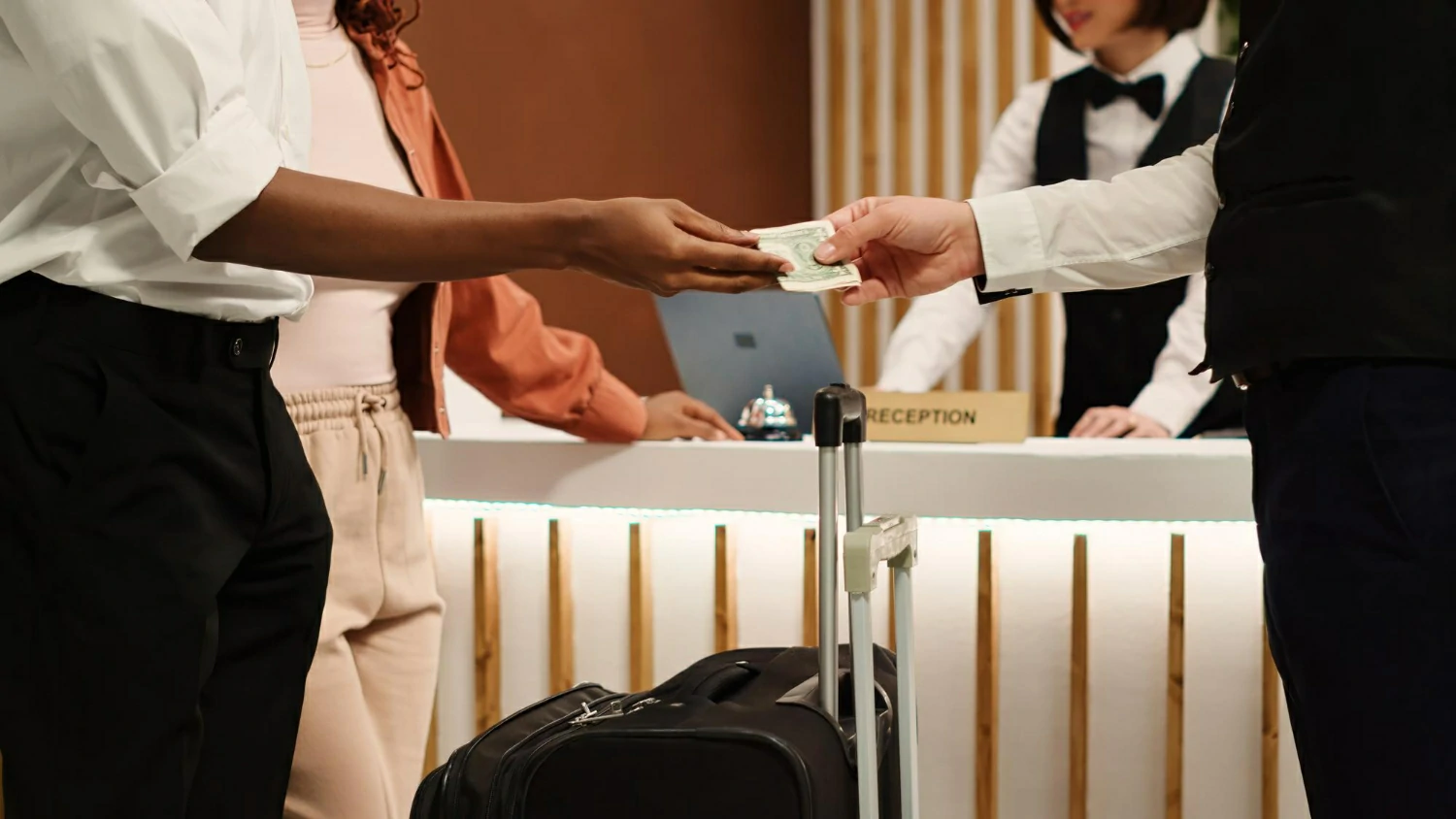What Does ‘Pay At Property’ Mean For Hotel Bookings? The Answer is – The “Pay at Property” option for hotel bookings provides flexibility by allowing you to reserve your room without making an immediate payment. Instead, you settle the full cost of your stay directly with the hotel upon arrival or checkout. This can be done using cash, credit card, or any other accepted payment method by the hotel.
Summary
- Flexibility: You don’t have to pay upfront, giving you more financial freedom.
- Ease of Cancellation: Often, these bookings have more relaxed cancellation policies.
- Potential Price Changes: Room rates might fluctuate between booking and your stay.
- Pre-authorization Holds: The hotel may place a temporary hold on your card to confirm its validity.
What Does ‘Pay at Property’ Mean for Hotel Bookings?

When booking hotels online, you’ll often encounter the “Pay at Property” option alongside the standard prepayment method.
This alternative payment mode offers several advantages and a few things to consider when planning your trip.
What is the “Pay at Property” option in hotel bookings?
The “Pay at Property” option lets you reserve your hotel room without immediate payment. You provide your credit card information to guarantee the reservation, but your card is not charged until you arrive at the hotel.
Upon arrival or checkout, you’ll settle your bill directly with the hotel using a payment method of your choice – cash, credit card, debit card, or potentially other options like digital wallets depending on the property.
Why you might consider “Pay at Property”
- Financial Flexibility: You aren’t charged upfront, allowing you to manage your travel budget more fluidly. This is especially beneficial if you’re booking far in advance or have unexpected expenses.
- Easier Cancellations: “Pay at Property” bookings often have more flexible cancellation policies compared to prepaid reservations. This can be a lifesaver if your plans need to change.
- Potential for Price Drops: If hotel rates decrease between your booking date and your stay, you might be able to negotiate a lower rate upon arrival.
Benefits of “Pay at Property”
1. Financial Flexibility
- No Immediate Cash Outflow: One of the biggest advantages is that it doesn’t tie up your funds immediately. This is especially important for longer trips, bookings made far in advance, or if you’re traveling on a budget. You can allocate that money for other travel expenses or keep it available for emergencies.
- Managing Unexpected Costs: Life can be unpredictable. With “Pay at Property,” you have more wiggle room if unexpected expenses arise before your trip. You won’t need to worry about seeking refunds from the hotel and potentially incurring fees.
2. Easier Changes or Cancellations
- Less Stressful Planning: Travel plans can change due to work, family, or unforeseen circumstances. “Pay at Property” bookings often come with more relaxed cancellation policies compared to prepaid rates where you might lose some or all of your money.
- No Hassle with Refunds: If you need to cancel, you won’t have to wait for the hotel to process a refund, potentially saving you time and avoiding any refund processing fees.
Sarah Lee Travel Expert
“Many travelers value the ‘Pay at Property’ option purely for the peace of mind it gives them. Knowing they can easily adjust their plans if needed removes a significant source of stress.” – Sarah Lee, veteran travel blogger
3. Potential for Better Deals if Prices Drop
- Market Monitoring: Hotel prices fluctuate based on demand and seasonality. If you book with “Pay at Property” and the hotel rate drops before your arrival, you might be able to negotiate a lower price upon check-in.
- Flexibility to Switch: If you find a significantly better deal at a different hotel, you can easily switch your booking, provided it’s within the cancellation window of your original “Pay at Property” reservation.
Important Note: While potential savings exist, they are not guaranteed. Always monitor hotel rates and compare prices regularly.
Remember: Always check the specific hotel’s “Pay at Property” and cancellation policies before booking. Some properties may have restrictions or earlier payment deadlines.
Considerations for “Pay at Property”

1. Risk of Price Increases
Market Fluctuations: Hotel prices are dynamic and can change based on factors like seasonality, special events, and overall demand. While the “Pay at Property” option offers the potential to benefit from price drops, the opposite is also possible. If room rates increase between the time of your booking and your stay, you’ll end up paying more.
Mitigating the Risk: There are ways to reduce this risk:
- Book during the off-season: Price increases are less likely when demand is lower.
- Monitor price trends: Use price tracking tools or regularly check hotel websites and booking platforms to monitor room rates.
- Consider price-lock options: Some hotels or booking sites might offer the option to lock in your current rate for a small fee.
2. Pre-authorization Holds on Your Card
Understanding Pre-authorizations: Even though you’re not paying upfront, the hotel will likely place a pre-authorization hold on your credit or debit card. This is done to verify the card’s validity and ensure you have sufficient funds or available credit to cover your stay.
Amount and Duration: The held amount could be the estimated total of your stay, a per-night deposit, or a fixed amount set by the hotel. This hold can last for several days or even until you check out.
Impact on Available Funds: It’s essential to be aware of pre-authorization holds because they temporarily reduce your available credit or bank balance. Make sure you have enough to cover the potential hold amount plus your other planned expenses.
3. Hotel’s Specific Payment Policies
The Fine Print Matters: “Pay at Property” doesn’t mean there are no rules. Every hotel has its own policies regarding this booking option, so always read the fine print carefully. Here’s what to look out for:
- Payment Deadlines: Some hotels may require payment a certain number of days before arrival instead of directly upon check-in.
- Accepted Payment Methods: Confirm which forms of payment the hotel accepts when you arrive (e.g., cash, specific credit cards, digital wallets).
- Restrictions on Room Types: Occasionally, “Pay at Property” rates might only be available for certain room categories.
- Additional Fees or Deposits: Check if the hotel charges any extra fees or security deposits specifically associated with “Pay at Property” bookings.
Daniel Fisher
“Always reach out to the hotel directly if you have any questions about their ‘Pay at Property’ policies. It’s better to clarify everything beforehand than to be surprised upon arrival.” – Daniel Fisher, Hotel Management Consultant with over 15 years of experience.
Common Questions About “Pay at Property”

How do I guarantee my reservation without prepayment?
- Credit/Debit Card Details: While you won’t be charged upfront, most hotels require you to provide valid credit or debit card information when making a “Pay at Property” reservation. This serves as a guarantee for the hotel in case of no-shows or late cancellations outside of their policy window.
- Hotel Reputation Counts: Reputable hotels and booking platforms honor “Pay at Property” reservations. Your reservation confirmation is usually enough, but if you’re concerned, contact the hotel directly to reconfirm.
- Caveat: Certain hotels during peak season or for special events might ask for a small deposit to secure your booking even with a “Pay at Property” option.
When will I need to pay for my stay?
Varies by Hotel: There’s no single answer as payment timing depends on the hotel’s specific policies. Here are the most common scenarios:
- Upon Arrival: You settle the bill when checking into the hotel.
- Upon Checkout: You pay as you depart.
- Before Arrival: Some hotels require payment a few days or a week before your scheduled arrival date.
Are there any hidden fees or charges?
Transparency is Key: Reputable hotels should clearly disclose all fees and charges associated with your booking, regardless of whether you choose “Pay at Property” or prepayment.
What to Scrutinize: Pay close attention to:
- Resort Fees: Some hotels, particularly in resort areas, charge a mandatory daily resort fee that might not be immediately obvious.
- Taxes and Surcharges: These vary by location and can add a significant amount to your bill.
- Incidental Charges: Be aware of potential charges for things like minibar usage, room service, or parking.
Conclusion
The “Pay at Property” option provides travelers with valuable flexibility and convenience when booking hotel accommodations. Here’s a recap of when it might be a smart choice:
- When you need financial flexibility: If you want to keep your cash flow free for other travel expenses or prefer to pay closer to your stay.
- When your plans are uncertain: If there’s a chance you might need to change or cancel your trip, “Pay at Property” usually offers less restrictive cancellation policies.
- When you’re price-conscious: You can monitor hotel rates after booking and potentially secure a better deal if prices drop.
References
Learn more about “Pay at Property” on major booking platforms:
- Booking.com
- Expedia
- Join the discussion on travel forums like TripAdvisor or FlyerTalk to see what other travelers say about the “Pay at Property” experience







